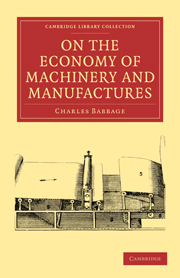Book contents
- Frontmatter
- PREFACE
- Contents
- INTRODUCTION: STATEMENT OF THE OBJECT AND PLAN OF THE WORK
- CHAPTER I SOURCES OF THE ADVANTAGES ARISING FROM MACHINERY AND MANUFACTURES
- CHAPTER II ACCUMULATING POWER
- CHAPTER III REGULATING POWER
- CHAPTER IV INCREASE AND DIMINUTION OF VELOCITY
- CHAPTER V EXTENDING TIME OF ACTION OF FORCES
- CHAPTER VI SAVING TIME IN NATURAL OPERATIONS
- CHAPTER VII EXERTING FORCES TOO GREAT FOR HUMAN POWER, AND EXECUTING OPERATIONS TOO DELICATE FOR HUMAN TOUCH
- CHAPTER VIII REGISTERING OPERATIONS
- CHAPTER IX ECONOMY OF MATERIALS EMPLOYED
- CHAPTER X OF THE IDENTITY OF THE WORK WHEN IT IS OF THE SAME KIND, AND OF ITS ACCURACY WHEN OF DIFFERENT KINDS
- CHAPTER XI OF COPYING
- CHAPTER XII ON THE METHOD OF OBSERVING MANUFACTORIES
- CHAPTER XIII ON THE DIFFERENCE BETWEEN MAKING AND MANUFACTURING
- CHAPTER XIV ON THE INFLUENCE OF VERIFICATION ON PRICE
- CHAPTER XV ON THE INFLUENCE OF DURABILITY ON PRICE
- CHAPTER XVI ON PRICE, AS MEASURED BY MONEY
- CHAPTER XVII OF RAW MATERIALS
- CHAPTER XVIII OF THE DIVISION OF LABOUR
- CHAPTER XIX ON THE DIVISION OF MENTAL LABOUR
- CHAPTER XX ON THE SEPARATE COST OF EACH PROCESS IN A MANUFACTURE
- CHAPTER XXI ON THE CAUSES AND CONSEQUENCES OF LARGE FACTORIES
- CHAPTER XXII ON THE POSITION OF GREAT FACTORIES
- CHAPTER XXIII ON OVER-MANUFACTURING
- CHAPTER XXIV INQUIRIES PREVIOUS TO COMMENCING ANY MANUFACTORY
- CHAPTER XXV ON CONTRIVING MACHINERY
- CHAPTER XXVI PROPER CIRCUMSTANCES FOR THE APPLICATION OF MACHINERY
- CHAPTER XXVII ON THE DURATION OF MACHINERY
- CHAPTER XXVIII ON COMBINATION AMONGST MASTERS OR WORKMEN AGAINST EACH OTHER
- CHAPTER XXIX ON COMBINATIONS OF MASTERS AGAINST THE PUBLIC
- CHAPTER XXX ON THE EFFECT OF TAXES AND OF LOCAL RESTRICTIONS UPON MANUFACTURES
- CHAPTER XXXI ON THE EXPORTATION OF MACHINERY
- CHAPTER XXXII ON THE FUTURE PROSPECTS OF MANUFACTURES, AS CONNECTED WITH SCIENCE
CHAPTER XXX - ON THE EFFECT OF TAXES AND OF LOCAL RESTRICTIONS UPON MANUFACTURES
Published online by Cambridge University Press: 29 August 2010
- Frontmatter
- PREFACE
- Contents
- INTRODUCTION: STATEMENT OF THE OBJECT AND PLAN OF THE WORK
- CHAPTER I SOURCES OF THE ADVANTAGES ARISING FROM MACHINERY AND MANUFACTURES
- CHAPTER II ACCUMULATING POWER
- CHAPTER III REGULATING POWER
- CHAPTER IV INCREASE AND DIMINUTION OF VELOCITY
- CHAPTER V EXTENDING TIME OF ACTION OF FORCES
- CHAPTER VI SAVING TIME IN NATURAL OPERATIONS
- CHAPTER VII EXERTING FORCES TOO GREAT FOR HUMAN POWER, AND EXECUTING OPERATIONS TOO DELICATE FOR HUMAN TOUCH
- CHAPTER VIII REGISTERING OPERATIONS
- CHAPTER IX ECONOMY OF MATERIALS EMPLOYED
- CHAPTER X OF THE IDENTITY OF THE WORK WHEN IT IS OF THE SAME KIND, AND OF ITS ACCURACY WHEN OF DIFFERENT KINDS
- CHAPTER XI OF COPYING
- CHAPTER XII ON THE METHOD OF OBSERVING MANUFACTORIES
- CHAPTER XIII ON THE DIFFERENCE BETWEEN MAKING AND MANUFACTURING
- CHAPTER XIV ON THE INFLUENCE OF VERIFICATION ON PRICE
- CHAPTER XV ON THE INFLUENCE OF DURABILITY ON PRICE
- CHAPTER XVI ON PRICE, AS MEASURED BY MONEY
- CHAPTER XVII OF RAW MATERIALS
- CHAPTER XVIII OF THE DIVISION OF LABOUR
- CHAPTER XIX ON THE DIVISION OF MENTAL LABOUR
- CHAPTER XX ON THE SEPARATE COST OF EACH PROCESS IN A MANUFACTURE
- CHAPTER XXI ON THE CAUSES AND CONSEQUENCES OF LARGE FACTORIES
- CHAPTER XXII ON THE POSITION OF GREAT FACTORIES
- CHAPTER XXIII ON OVER-MANUFACTURING
- CHAPTER XXIV INQUIRIES PREVIOUS TO COMMENCING ANY MANUFACTORY
- CHAPTER XXV ON CONTRIVING MACHINERY
- CHAPTER XXVI PROPER CIRCUMSTANCES FOR THE APPLICATION OF MACHINERY
- CHAPTER XXVII ON THE DURATION OF MACHINERY
- CHAPTER XXVIII ON COMBINATION AMONGST MASTERS OR WORKMEN AGAINST EACH OTHER
- CHAPTER XXIX ON COMBINATIONS OF MASTERS AGAINST THE PUBLIC
- CHAPTER XXX ON THE EFFECT OF TAXES AND OF LOCAL RESTRICTIONS UPON MANUFACTURES
- CHAPTER XXXI ON THE EXPORTATION OF MACHINERY
- CHAPTER XXXII ON THE FUTURE PROSPECTS OF MANUFACTURES, AS CONNECTED WITH SCIENCE
Summary
(304.) As soon as a tax is put upon any article, the ingenuity of those who make, and of those who use it, is directed to the means of evading as large a part of that tax as they can; and this may often be accomplished in ways that are perfectly fair and legal. An excise duty exists at present of 3d. per pound upon all writing-paper. The effect of this impost is, that much of the paper which is employed, is made extremely thin, in order that the weight of a given number of sheets may be as small as possible. Soon after the first imposition of the tax upon windows, which depended upon their number, and not upon their size, new-built houses began to have fewer windows and of a larger size than before. Staircases were lighted by extremely long windows, illuminating three or four flights of stairs. When the tax was increased, and the size of windows charged as single was limited, then still greater care was taken to have as few windows as possible, and internal lights became frequent. These internal lights in their turn became the subject of taxation; but it was easy to evade the discovery of them, and in the last act of parliament, reducing the assessed taxes, they ceased to be chargeable.
From the changes thus successively introduced in the number, the forms, and the positions of the windows, a tolerable guess might, in some instances, be formed of the age of a house.
(305.) The effects of regulations of excise upon our home manufactures are often productive of inconvenience; and check, in some measure, the natural progress of improvement.
- Type
- Chapter
- Information
- On the Economy of Machinery and Manufactures , pp. 271 - 291Publisher: Cambridge University PressPrint publication year: 2010First published in: 1832



